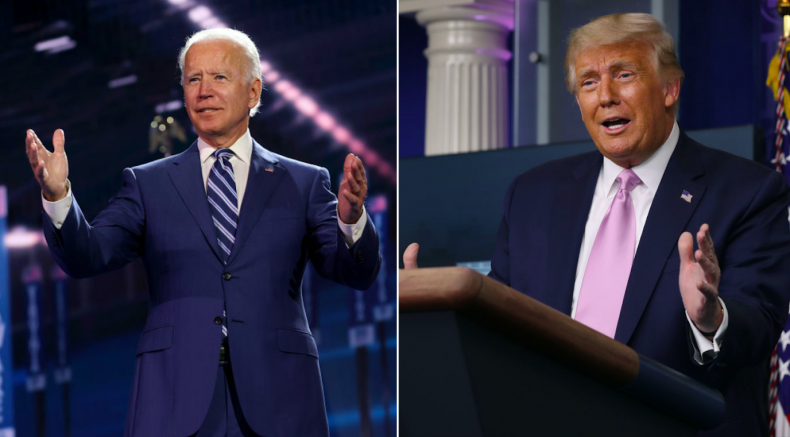BY JASON LEMON
 Ahead of the 2016 election, most polls and analysts projected that former Democratic presidential candidate Hillary Clinton would beat President Donald Trump, but there were a few election experts with models that projected the GOP candidate's upset victory.
Ahead of the 2016 election, most polls and analysts projected that former Democratic presidential candidate Hillary Clinton would beat President Donald Trump, but there were a few election experts with models that projected the GOP candidate's upset victory.
Now, about two and a half months before election day on November 3, most polls show Democratic presidential nominee Joe Biden leading Trump. Many analysts once again are suggesting that the Democratic candidate will likely beat out his Republican rival. But what do four experts who predicted Trump's election in 2016 think about the upcoming election? It turns out their predictions are mixed heading into this year's presidential contest.
Academics Allan Lichtman, a history professor at American University, Helmut Norpoth, a professor of political science at Stony Brook University, Ray Fair, a professor of economics at Yale University, and Alan Abramowitz, a professor of political science at Emory University, all put forward separate models ahead of the 2016 election, each showing Trump beating out Clinton, despite the mainstream consensus. Their projections don't all align in 2020, but here's a look at the insights their models provide.
In this compilation image, Democratic presidential nominee Joe Biden appears on stage during Democratic National Convention on August 19 in Wilmington, Delaware, and President Donald Trump speaks during a news conference at the White House on August 19 in Washington, D.C.WIN MCNAMEE/CHIP SOMODEVILLA/GETTY
Lichtman, whose projections through his "Keys model" have been correct since the 1984 election, told Newsweek on Thursday that he predicts Trump will lose on November 3.
"This is the system that in defiance of the polls and the pundits predicted Donald Trump's win in 2016. Now it is predicted that Trump will become the first president since George H. W. Bush in 1992 to lose a reelection bid," Lichtman said.
The academic explained that his model "relies on an index rather than a regression-based method." He explained that the Keys of his model are "13 diagnostic questions that are stated as propositions that favor reelection of the incumbent party."
"When five or fewer of these propositions are false (i.e., turned against the party holding the White House), that party wins another term in office," Lichtman said. "When six or more are false, the challenging party wins." He said that Trump is now down seven keys, but noted there are two factors that could potentially throw a wrench in his model: "voter suppression and Russian intervention."
When contacted by email, Norpoth referred Newsweek to his website, titled The Primary Model. Just as in 2016, Norpoth's model projects Trump will win again in 2020. In fact, the professor's projection gives the incumbent president a better chance of winning than it did four years ago against Clinton.
"The PRIMARY MODEL gives President Donald Trump a 91 percent chance of winning the 2020 presidential election, with Democrat Joe Biden having just a 9 percent chance. Trump would get 362 electoral votes, Biden 176," Norpoth's forecast, which was finalized on March 2, predicts.
Notably, in 2016 the model gave Trump slightly worse of a chance, as it was just 87 percent certainty. Norpoth's model has been correct in five of the past six presidential elections.
Fair's model relies primarily on economic factors and takes into account how long a specific political party has held office. Although his model projected in 2016 that Trump would win, due largely to sluggish economic growth per capita over the past four years, the academic isn't currently making a projection. His website notes that the model "has nothing to say about the effects of pandemics."
When contacted by Newsweek, Fair said that individuals could use the tool on his website to calculate their own predictions. Some, including Oxford Economics, have used his model to make a projection. The Oxford Economics prediction shows Biden winning over Trump by a margin of 65 percent to 35 percent.
Back in 2016, Abramowitz took into consideration GDP growth, presidential approval rating and the number of years each main party (Republicans and Democrats) held the presidency. This led him to project that the GOP candidate—Trump—would win with more than 51 percent of the vote.
Although Abramowitz did not respond to Newsweek's request for comment, he published a paper on August 4 that said his model showed Trump only had about a 30 percent chance of winning in this election cycle.
"The president's net approval rating of -15 percent in late June yields a forecast of a decisive 319-219 vote victory by Joe Biden in the Electoral College. Yet the model still gives Trump about a 30% chance of winning the election due to uncertainty about what will transpire between June and November," Abramowitz wrote.
Of course, projections are just highly educated guesses. But as these four academics got it right in 2016, their predictions appear to many to be more credible than those suggesting Clinton would win by a significant margin. When tallying up their predictions for 2020, Biden appears to be favored; with two calling the election for Biden, one pointing to a Trump victory and the other suggesting his model doesn't account for the impact of the ongoing novel coronavirus pandemic.
No comments:
Post a Comment